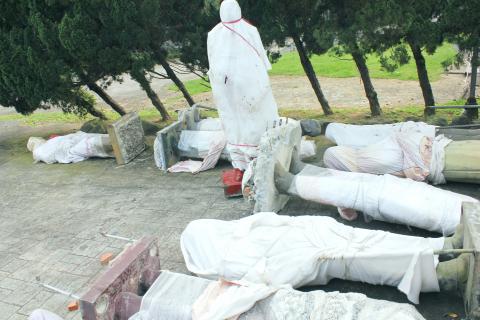Tainan Mayor William Lai (賴清德) yesterday defended his administration’s removal of Chiang Kai-shek (蔣介石) statues from city schools, saying the move was a step toward transitional justice by freeing students from political totems and restoring political neutrality on campuses.
His comments came a day after the Tainan City Government removed statues from 14 elementary and junior-high schools.
Some residents, including former Tainan county commissioner Su Huan-chih (蘇煥智), criticized the operation as “secretive” because the schools were not notified in advance, although they were told to take photographs as proof the statues were taken down after the removal teams arrived.

Photo: Lin Tzu-hsiang, Taipei Times
Su is a member of the Democratic Progressive Party (DPP), as is Lai.
“Must [the removals] be carried out in such an unthoughtful manner that may provoke conflicts,” Su wrote in a Facebook post.
However, Lai yesterday reminded critics that during events last month to mark the 68th anniversary of the 228 Incident, he said that the city government would remove statues and busts of Chiang from the city’s schools.
The city government did not inform school authorities of the exact date of the removal operation to avoid unnecessary conflicts or disturbing classes, he said.
The statues would be sent to Taoyuan’s Dasi District (大溪), he said.
The Cihu Memorial Sculpture Garden adjacent to Chiang’s mausoleum in Dasi has about 200 statues and busts of the former president that have been removed from schools, parks and other places around the nation since 2000.
Lai said the schools could decide for themselves how to use the space formerly occupied by a Chiang statue, and the city would subsidize their plans.
Meanwhile, Chinese Nationalist Party (KMT) Legislator Alex Tsai (蔡正元) and other party members criticized the Tainan City Government’s removal of the statues.
Tsai said it was another example of Lai’s tendency to rave about Japanese-related affairs.
“How can the greatness of Japan be demonstrated without renouncing Chiang Kei-shek?” Tsai said.
Lai does not understand that heaping praise on Japan at the expense of the Republic of China’s leadership might bring the nation to destruction instead of independence, the lawmaker said.
Hsieh Lung-chieh (謝龍介), head of the KMT’s Tainan chapter, said the removal of the statues was an attempt to purge an important historical figure from the public’s memory.
Chiang’s merits or failures should be openly discussed, but Lai is using his personal popularity and political views to polarize society, Hsieh said.
However, DPP Tainan City Councilor Chiu Li-li (邱莉莉) backed the city’s action, saying the Chiang statues were products of a totalitarian regime.
Schools are where knowledge and values are passed down, and only statues representing figures that have had a positive impact on society should be placed on campuses, she said.
Chiu’s colleague, DPP City Councilor Chen Yi-chen (陳怡珍), said the Chiang statues are symbols of an authoritarian regime, which should have been removed from the school campuses long ago.
Additional reporting by CNA

An essay competition jointly organized by a local writing society and a publisher affiliated with the Chinese Communist Party (CCP) might have contravened the Act Governing Relations Between the People of the Taiwan Area and the Mainland Area (臺灣地區與大陸地區人民關係條例), the Mainland Affairs Council (MAC) said on Thursday. “In this case, the partner organization is clearly an agency under the CCP’s Fujian Provincial Committee,” MAC Deputy Minister and spokesperson Liang Wen-chieh (梁文傑) said at a news briefing in Taipei. “It also involves bringing Taiwanese students to China with all-expenses-paid arrangements to attend award ceremonies and camps,” Liang said. Those two “characteristics” are typically sufficient

A magnitude 5.9 earthquake that struck about 33km off the coast of Hualien City was the "main shock" in a series of quakes in the area, with aftershocks expected over the next three days, the Central Weather Administration (CWA) said yesterday. Prior to the magnitude 5.9 quake shaking most of Taiwan at 6:53pm yesterday, six other earthquakes stronger than a magnitude of 4, starting with a magnitude 5.5 quake at 6:09pm, occurred in the area. CWA Seismological Center Director Wu Chien-fu (吳健富) confirmed that the quakes were all part of the same series and that the magnitude 5.5 temblor was

The brilliant blue waters, thick foliage and bucolic atmosphere on this seemingly idyllic archipelago deep in the Pacific Ocean belie the key role it now plays in a titanic geopolitical struggle. Palau is again on the front line as China, and the US and its allies prepare their forces in an intensifying contest for control over the Asia-Pacific region. The democratic nation of just 17,000 people hosts US-controlled airstrips and soon-to-be-completed radar installations that the US military describes as “critical” to monitoring vast swathes of water and airspace. It is also a key piece of the second island chain, a string of

The Central Weather Administration has issued a heat alert for southeastern Taiwan, warning of temperatures as high as 36°C today, while alerting some coastal areas of strong winds later in the day. Kaohsiung’s Neimen District (內門) and Pingtung County’s Neipu Township (內埔) are under an orange heat alert, which warns of temperatures as high as 36°C for three consecutive days, the CWA said, citing southwest winds. The heat would also extend to Tainan’s Nansi (楠西) and Yujing (玉井) districts, as well as Pingtung’s Gaoshu (高樹), Yanpu (鹽埔) and Majia (瑪家) townships, it said, forecasting highs of up to 36°C in those areas